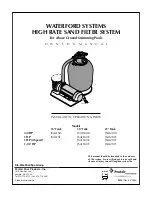
P/N • Réf. 472090
Rev. G • Rév. G 5-27-04
10
GAS CONNECTIONS
GAS LINE INSTALLATIONS
Before installing the gas line, be sure to check which gas the heater has been designed to burn. This is
important because different types of gas require different gas pipe sizes. The rating plate on the heater will
indicate which gas the heater is designed to burn. The tables, shown on page
11,
show which size pipe is
required for the distance from the gas meter to the heater. The table is for natural gas at a specific gravity
of .65 and propane at a specific gravity of 1.55.
When sizing gas lines, calculate three (3) additional feet of straight pipe for every elbow used. When
installing the gas line, avoid getting dirt, grease or other foreign material in the pipe as this may cause
damage to the gas valve, which may result in heater failure.
The gas meter should be checked to make sure that it will supply enough gas to the heater and any other
appliances that may be used on the same meter. The gas line from the meter will usually be of a larger size
than the gas valve supplied with the heater. Therefore a reduction of the connecting gas pipe will be
necessary. Make this reduction as close to the heater as possible.
The heater and any other gas appliances must be disconnected from the gas supply piping system during any
pressure testing on that system, (greater that ½ PSIG). The heater and its gas connection must be leak tested
before placing the heater in operation.
Do not use flame to test the gas line.
Use soapy water or another
nonflammable method.
NOTE
A manual main shut-off valve must be installed externally to the heater.
HEATER CABINET
UNION
TEE
FITTING
GAS
SUPPLY
3 INCHES
MINIMUM
MANUAL
SHUT OFF
VALVE
NIPPLE
CAP
GAS
VALVE
WARNING
DO NOT INSTALL THE GAS LINE UNION INSIDE THE HEATER CABINET. THIS WILL VOID YOUR WARRANTY.
Figure 3.
Section III. Installation
SEDIMENT TRAPS
Install a sediment in front of
the gas controls. The sediment
trap shall be either a tee fitting
with a capped nipple in the
bottom outlet which can be
removed for cleaning, as
illustrated in
Figure 3
, or a
other device recognized as an
effective sediment trap. All
gas piping should be tested
after installation in accordance
with local codes.











































